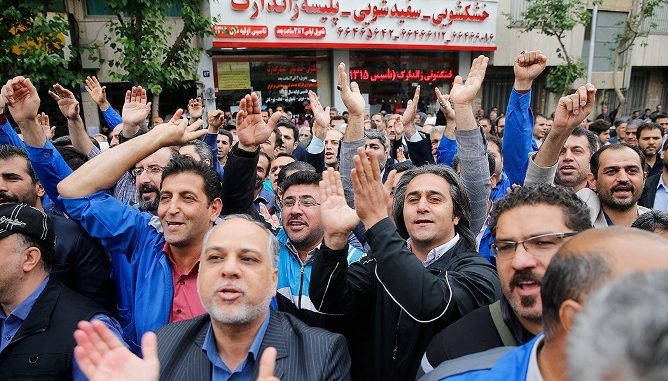
The Iranian regime has once again arrested Esmail Bakhshi, the representative of the Haft-Tapeh sugar cane agro-industry workers, and an activist Sepideh Qolian.
Esmail Bakhshi is known as the spokesman of Haft-Tapeh workers, who have not infrequently been the victims of delay and non-payment of their wages since the privatisation of the factory.
Esmail Bakhshi became famous because of his speeches against the employer and the pro-capitalist officials, voicing workers’ misery and poverty.
The first time he was beaten and injured by “anonymous” perpetrators was in 2017. However, this intimidation could not silence him.
Again, last November, security forces arrested him, alongside Sepideh Qolian and another worker, Moslem Armand. The regime repeated its lies and said they would face charges of acting against national security. This is the charge which the regime typically brings against activists to condemn them to long-term prison sentences.
Despite the regime’s bullying, the workers continued their strike, marched in Shush town, and called for the freedom of Bakhshi and Qolian. Steel workers in Ahvaz, the capital of the province, also called for Bakhshi’s freedom. Teachers and students showed their solidarity with the imprisoned labour activists.
The arrest also attracted the attention of public opinion and activists around the world. More than 80 trade unions across the world protested against the arrest of Bakhshi in their letters to the regime’s leader and officials.
Reports were published on the torture of Bakhshi and Qolian in prison which, as always, the regime brazenly denied. Finally, under the pressure of public opinion and the continuation of workers’ protests, the regime freed, in mid-December, Bakhshi and Qolian, after around one month’s detention.
The two released prisoners were silent for a while. There were suspicions that the regime intimidated them into silence. However, in early January, Bakhshi broke his silence and spoke out on his torture. He challenged the Intelligence Minister to a live TV debate. Sepiden Qolian also exposed how she and Bakhshi were tortured. This was a big scandal for a regime which hypocritically broadcasts reports on the ‘Yellow Vest’ movement in France but brutally represses workers at home.
All high-ranking officials, from the president’s chief of staff to the prosecutor-general, started an orchestrated campaign to whitewash the scandal. Naturally no one believed the propaganda of a regime that has executed imprisoned and tortured tens of thousands in its forty-year life.
The regime, as its last weapon, engaged in lie-mongering through its propaganda apparatus. It felt itself in a predicament and the regime resorted to obsolete outrageous methods. In mid-January, the regime’s TV channels broadcast “confessions” of Bakhshi and Qolian. Bakhshi and Qolian confessed to collaboration with communist parties in exile, intelligence services of the US, Israel and so on. However, the scenario was too ludicrous to convince anybody even inside the regime. The regime’s attempt to discredit militant workers and activists led to an opposite result. People condemned the regime’s shameless act. An instance was the slogan chanted by pensioners in one of their protest rallies outside parliament. They shouted: “Cannons, tanks and documentaries are no longer effective”. By “documentaries”, they referred to the so-called confessions of Bakhshi and Qolian.
On 21 January, the regime arrested Bakhshi and Qolian again. We are unaware of their situation in prison since the day of arrest.
Rising workers’ militancy and the regime’s confusion
The workers’ movement has leapt forward in the past year. There is a developing class consciousness and workers are starting to create new forms of organisation. For the first time, Haft-Tapeh workers formed an independent council and raised the idea of workers’ control. Workers ranging from truck drivers to teachers have been involved in struggle and suffered repression. What has led workers to this level of struggle is the worsening economic situation that has brought more misery and poverty for the workers. The regime, which is corrupt to the bone, has not been able to counter the movement, let alone finding a solution to the workers’ horrible life.
The rise of the workers’ movement not only put the regime in a corner but also overshadowed the bourgeois opposition. For one month, news on workers’ struggles and Bakhshi and Qolian were the main story in Iranian social media.
Iranian workers in their struggle against bosses, which are protected by one of the most bloodthirsty regimes in the contemporary history, need the solidarity of internationalist working class. Stand in solidarity with them! The expression of this solidarity, whether in large or small scale, will help stop the regime’s machine of repression.
Special financial appeal to all readers of socialistworld.net |
Support building alternative socialist media Socialistworld.net provides a unique analysis and perspective of world events. Socialistworld.net also plays a crucial role in building the struggle for socialism across all continents. Capitalism has failed! Assist us to build the fight-back and prepare for the stormy period of class struggles ahead. Please make a donation to help us reach more readers and to widen our socialist campaigning work across the world. |
Donate via Paypal |
| M | T | W | T | F | S | S |
|---|---|---|---|---|---|---|
| 1 | 2 | 3 | 4 | 5 | 6 | |
| 7 | 8 | 9 | 10 | 11 | 12 | 13 |
| 14 | 15 | 16 | 17 | 18 | 19 | 20 |
| 21 | 22 | 23 | 24 | 25 | 26 | 27 |
| 28 | 29 | 30 | 31 | |||


Be the first to comment